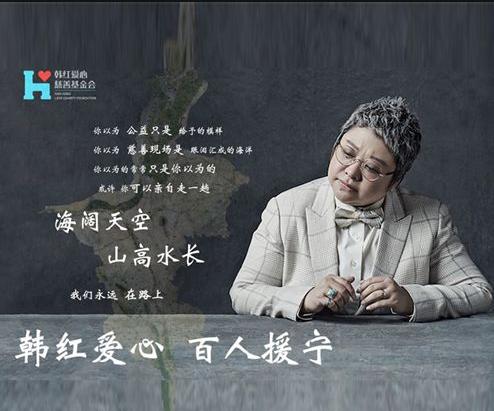Mao Amin, Na Ying, Han Hong, and Sun Yue were also known as the Four Great Queens of the Mainland at the end of the last century.
Han Hong, composer, singer, lyricist, music producer, philanthropist, director, host, founder of Han Hong Charity Foundation, chairman and CEO of Hualu Baina Entertainment Company, 2016 China Charity Celebrity List No. 1. On March 27, 2015, he won the championship of Hunan Satellite TV's "I Am a Singer Season 3".

Han Hong is a well-known ethnic minority female singer in China, a singer-songwriter. Born to be a singing billet, Han Hong's unique musicality benefits from her Tibetan ancestry, coupled with the influence of the art family, and the formal music training that began as a child, so that she has an extraordinary talent and understanding of music. Han Hong is also keen on charity, in 2007 launched the "Love Tibet Tour" and other public welfare activities, on May 14, 2008 set up the "Han Hong Love Rescue Team" to wenchuan disaster area to support the rescue, on May 9, 2012 registered the establishment of han Hong Love Charity Foundation.
Han Hong was born on September 26, 1971 in Karo District, Qamdo, Tibet, China, the Tibetan name Yangjin Dolma (Tibetan: དབྱངས་ཅན་སྒྲོལ་མ, Tibetan pinyin: yangjianma), originally from Dezhou, Shandong Province, who grew up in Beijing as a teenager, his father was a Han Chinese intellectual and cross-talk actor, and his mother was a Tibetan singer Yongxi.
At the age of 5, he joined the choir and sang. Han Hong's father was a cross-talk actor before his death, and he unfortunately died when Han Hong was 6 years old. After her father's death, her mother was often unable to take care of her because of her busy acting work. At the age of 9, Han Hong was sent to Beijing by her mother and began to rely on her grandmother and uncle. In 1980, at the age of 9, he officially joined the Children's Choir for formal training. He began songwriting in 1993.
In 1996, he won the gold medal of the Chinese singer pre-departure selection competition in Dalian, and in the same year, he won the gold medal for composition and singing in the "Kong Fansen" vocal works competition. Since 1996, he has been working as a songwriter and producer for other singers, mainly including "Good Night My Love", "Fly with You", etc., and has sung theme songs for TV series such as "Sui and Tang Dynasty", "Film Police", "Wildfire Spring Wind Fighting Ancient City" and so on.
In 1997, he wrote and recorded his debut album "Snowy Radiance" and then released his first radio recommendation song "Snowy Radiance" from the album.
In 1998, he created "Beauty in the Wind and Rain". On September 16, Han Hong's first solo album "Snowy Light" was launched.
In February 2000, "Beauty in the Wind and Rain" won the 1999 Shenzhou Excellent Recommendation Award in the Channel[v] Global Chinese Music Chart, and on March 15, at the "3.15" gala of CCTV, he sang the song "Dawn", which was specially created for the party.
At the beginning of January 2002, the latest single "Back" was launched, which was a public welfare environmental protection song commissioned by the CCTV "Oriental Time and Space" column group, and after the single hit the chart, it won the number one of dozens of domestic radio stations.
In 2005, a song "Heavenly Road" and "Beautiful Myth" with Sun Nan made Han Hong famous again.
On October 31, 2010, Han Hong sang the song "Amorous Land" at the closing ceremony of the Shanghai World Expo.
On May 12, 2015, he released his latest single "One Man". In September, he released his own single "Children from Afar".
In January 2016, Han Hong concentrated in Hong Kong and Taiwan to promote the new album "I Love, So I Am", and won the Top Ten Golden Melody Award in Hong Kong for the song "One Man".
On April 5, 2017, the debut original musical drama "Love of Arz Memory" composed by Han Hong was premiered in Beijing. In the same year, he was invited to participate in the 71st Tony Awards, becoming the first Chinese composer to be invited to participate in the Tony Awards.